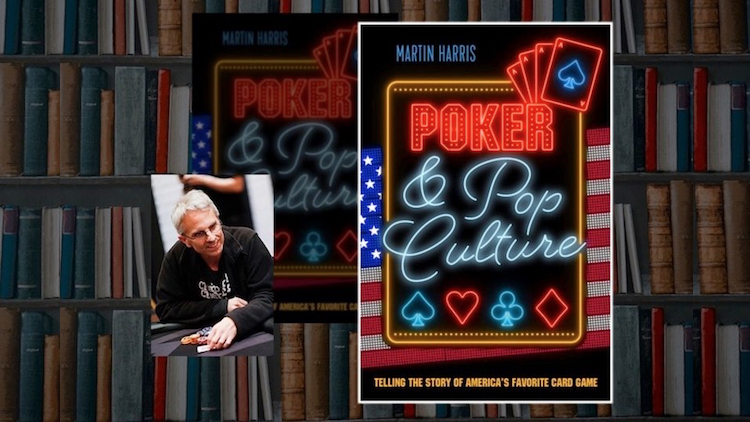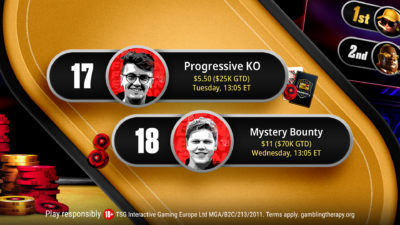You might have heard — PokerStars Blog’s own Martin Harris has a new book arriving this June titled Poker & Pop Culture: Telling the Story of America’s Favorite Card Game.
As the book’s description explains, Poker & Pop Culture presents the history of poker “from 19th-century steamboats and saloons to 21st-century virtual tables online,” while also showing “how the game’s portrayal in the mainstream has increased poker’s relevance to American history and shaped the way we think about the game and its significance.”
Thus in addition to chapters telling of poker being played (and portrayed) on the Mississippi, in the Old West, during the Civil War (and other wars), and in clubs and casinos, the book discusses in detail how poker has been presented in movies, on television, in magazines and books, in music, in paintings, and more.
As the description continues: “From Mark Twain to ‘Dogs Playing Poker” to W.C. Fields to John Wayne to A Streetcar Named Desire to the Cold War to Kenny Rogers to ESPN to Star Trek: The Next Generation and beyond, Poker & Pop Culture provides a comprehensive survey of cultural productions in which poker is of thematic importance.”
Also covered are the ways poker has intersected with politics, business, sports, and other areas of American culture. For example, the following excerpt comes from the chapter titled “Poker in the Board Room” that explores the many connections between poker and Wall Street.
from “Poker in the Board Room”
In early 1988, Warren Buffett wrote his annual letter to the shareholders of Berkshire Hathaway Inc., the multinational holding company for which he served as chairman and CEO. It was an especially tense time in the investment world, just a few months removed from the “Black Monday” crash that saw markets plunge precipitously around the world. On that day (October 19, 1987), the Dow Jones Industrial Average fell more than 22 percent, the largest single-day decline in the history of the index.
Amid his analysis – by turns sober and bullish – Buffett conjures the image of “a remarkably accommodating fellow named Mr. Market,” someone his investors were to regard as a kind of business partner. Mr. Market is mercurial and temperamental, and is really an opponent with whom the investor engages in something resembling a two-man poker game. If the analogy weren’t already obvious, Buffett then makes it explicit.
“If you aren’t certain that you can understand and can value your business far better than Mr. Market, you don’t belong in the game. As they say in poker, ‘If you’ve been in the game 30 minutes and you don’t know who the patsy is, you’re the patsy.’”
Poker players instantly recognize the line, long part of poker lore and adapted as the memorable opening to the 1998 film Rounders (“If you can’t spot the sucker in your first half-hour at the table, then you are the sucker”). For Buffett to evoke it is only to be expected, given that parallels between poker and the world of business and finance are so readily apparent. In America, a country in which capitalist ideology affects practically every aspect of society and culture, the analogy is all the more striking, with negotiations between self-interested players sitting around the table very much resembling – albeit in a sped up, stripped-down fashion – the transactions of profit-seeking individuals and entities engaged in trade and commerce.
Such comparisons date back to America’s early history. Though not a gambler himself, Thomas Jefferson nonetheless once conceded how the work of merchants, land owners, farmers and others can be construed as “games of chance” in the context of describing such pursuits as “indispensible” and not inherently immoral. We’ve considered as well how John Blackbridge, author of the 1875 book The Complete Poker-Player, began his defense of gambling in general and poker in particular by highlighting similarities between such “amusements” and socially accepted (and legal) forms of gambling that occur in the fields of banking, trade, investing, and insurance….
Being able to perform… mental maneuvers and see correlations others cannot is often a characteristic of the successful entrepreneur. More often than not, those who thrive the most in the world of business have demonstrated an appreciation of the game-like nature of their competition with others. Even though a game like poker is “nonproductive” (as Jefferson observed) and cannot involve on-table coalitions or partnerships (if played fairly), an understanding of how poker is played and the strategies that can produce profit are often both intriguing and genuinely useful to entrepreneurs.
There have been many examples of stock traders, fund managers, professional investors, and other varieties of magnates and moguls who have been drawn to poker, especially recently. Poker Hall of Famer Erik Seidel was a trader on the American stock exchange prior to his embarking on a successful and lucrative career in poker. Cliff Josephy, Dan Shak, Andy Frankenberger, Jason Strasser, Bill Chen, Rep Porter, Matt Glantz, James Vogl, Talal Shakerchi, Cary Katz and Steven Begleiter help form a long list of poker players who have similarly transitioned from the business world to poker (or who continue to straddle both). Many business leaders frequently turn up at the tables, especially in high-stakes cash games and “high roller” tournaments. Some of these games are spread especially to accommodate the deep-pocketed players anxious to test acumen honed in the business world against some of the game’s best.
There are many others noted for their successes in the world of business who have found poker a favorite, sometimes serious recreation. Their examples and commentary help provide more reason to appreciate poker’s influence in yet another area of American culture.
Poker & Pop Culture: Telling the Story of America’s Favorite Card Game is available for pre-order in paperback and as an e-book at D&B Poker.
D&B Publishing (using the imprint D&B Poker) was created by Dan Addelman and Byron Jacobs 15 years ago. Since then it has become one of the leading publishers of poker books with titles by Phil Hellmuth, Jonathan Little, Mike Sexton, Chris Moorman, Dr. Patricia Cardner, Lance Bradley, Greg Raymer and more, all of which are available at D&B Poker.
Back to Top







